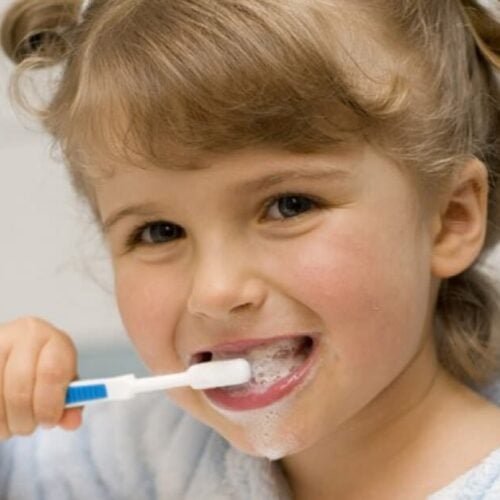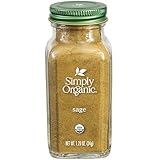I have a history of lots of painful dental work and orthodonture. As a child, I wore braces and other orthodontic appliances for seven years, so once my daughter grew some teeth, we were particularly concerned that they remain healthy, straight and strong.
The good news is that having healthy teeth is not as much a matter of genetics, as of diet.
Because tooth decay and crowded teeth are often symptoms of nutritional deficiencies, a whole food, nutrient-dense diet is the best protection against tooth decay and bad orthodonture.
The Problem with Fluoride
Ever wonder why most kids’ toothpastes have no fluoride? Because kids inevitably will swallow some paste, and fluoride is extremely TOXIC. In fact, eating a tube of toothpaste will kill a child (and seriously harm an adult), so be sure to keep any fluoride paste or mouthwash out of the reach of little ones, just like you do with bathroom cleaners and medicines.
For me, this begs the question:
Why are we putting a toxic chemical that everyone agrees should not be swallowed into our food and water supply in the first place?
Most people don’t know that the type of fluoride added to water supplies, toothpastes, and many beverages and foods is typically a waste product of the nuclear, aluminum, and phosphate (fertilizer) industries.
The EPA has classified fluoride as a toxin. Fluoride is so toxic that, in addition to being a primary, active ingredient in rat and cockroach poisons, pest fumigants and crop pesticides, fluoride is also an active ingredient in anesthetic, hypnotic, and psychiatric drugs, as well as nerve gas used by the military.
Under the U.S. Safe Water Drinking Act, it is illegal to dump fluoride in lakes, streams and oceans, but, for some strange reason, it’s OK to dump fluoride into our food and water supplies and then rub it into our teeth and gums twice a day. Hmmmmm.
Do we really want this stuff in our bodies at all, especially when there are non-toxic alternatives that work just as well?
Fluoride Is Not Safe or Effective
You might be worried about how removing fluoride from our drinking water or toothpaste might affect our teeth, but you needn’t be.
While topically-applied fluoride can help prevent tooth decay in people who eat poorly, all of the recent large-scale studies of ingesting fluoridated water have shown that there are no proven, positive effects from the practice.
None. No proof.
But there is plenty of proof of harm, including dental fluorosis, osteoporosis and bone scarring, brain tumors, fluoroderma, and more. In fact, the most recent Harvard study found that fluoride exposure can impair the neurological development of children!
According to statistics from the World Health Organization, the tooth decay rates of countries which do not fluoridate their water supplies are just as low, or even lower, than those countries which do. Furthermore, several studies published since 2000 have reported that there has been no increase in tooth decay rates noted in communities which ended water fluoridation.
Water fluoridation is illegal, banned or just not used in an overwhelming number of countries, including most industrialized countries. Despite pressure from the dental industry, 97% of continental western Europe has rejected, banned, or stopped fluoridation due to environmental, health, legal, or ethical concerns. And yet, their children’s teeth are just as healthy as children’s teeth in the U.S! In fact, in many parts of Europe where traditional, whole food diets prevail, they are healthier.
The good news is that the voice of concerned, unbiased science is beginning to overwhelm all the pro-fluoride industry propaganda. For example, in November 2006, the American Dental Association advised parents to avoid giving fluoridated water to babies or using it to make formula.
DO NOT GIVE FLUORIDATED TAP WATER TO BABIES OR USE IT TO MAKE FORMULA!
Take the advice, and protect yourself and your children by avoiding the consumption of fluoride.
Here’s more about the dangers of fluoride and how to keep your teeth healthy:
This is our family recipe for fluoride-free toothpaste. It helps remove stains, leaves a fresh feeling in the mouth, helps relieve sensitive teeth, and saves money.

Homemade Non-Toxic Toothpaste
Equipment
Ingredients
- ¼ cup eggshell calcium, or calcium-magnesium tablets, ground up
- 1 Tbsp. baking soda, (mild abrasive)
- 1 Tbsp. sea salt, finely ground (mild antibacterial, whitener and good for the gums)
- 1 Tbsp. xylitol , (or a few drops of liquid stevia, to taste)
- ½ tsp. dried sage, (Optional; sage is antimicrobial, but it has a strong taste)
- 5-10 drops peppermint essential oil, or other food-grade, flavored oil, according to the taste you want (be sparing, they are very strong)
- 1-3 Tbsp. virgin coconut oil, (softened but not liquified)
Instructions
- Grind all ingredients in a small coffee grinder to make as fine a powder as possible.
- Mix all ingredients except the coconut oil, to taste. You can stop at this stage and use this as a tooth powder if you wish.
- For paste, use a fork to thoroughly mix in a teaspoon of coconut oil at a time until you find the right consistency.
- Put into a small, sealable jar or squeezable container and keep in a relatively cool place.
- Brush. Don’t forget to floss!
Notes
Recommended for This Recipe
If you still have doubts, this movie from the Environmental Working Group expertly sums up how and why to avoid fluoride wherever you can.












